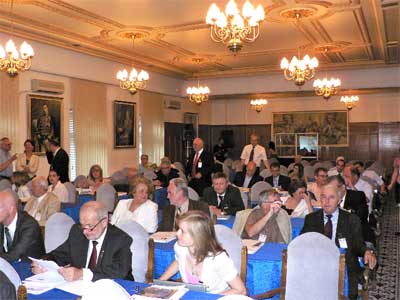
European
Nuclear Society
e-news
Issue 26 Autum 2009
http://www.euronuclear.org/e-news/e-news-26/nuc-energy-enviroment.htm

Among the scientific meetings that were organized recently on the occasion of the state visit to Romania of Their Majesties the King and Queen of the Belgium, one of the more significant ones was a Romanian-Belgian seminar entitled Nuclear Energy and the Environment. It took place in one of the conference rooms at the Cercul Militar of Bucharest, on Wednesday, July 8. The event marked a new phase in the further strengthening of the links that have been forged between Belgium and Romania by institutions and companies involved in the field of nuclear energy. These links were established a long time ago and the signature of two new Memorandums of Understanding (MoUs) will provide further evidence that this lasting tradition of cooperation remains as strong as ever. Events like this seminar are necessary for sharing increased knowledge of joint activities and issues with a broader audience beyond those directly involved.
The first part of the seminar was a session shared jointly with another important and interesting seminar entitled: Energy resources for the future: the Belgian and Romanian perspectives. Firstly, introductory speeches were given by the two chairmen, Prof. Michel Giot, President of the Scientific Council of SCKCEN (Belgium’s Study Center for Nuclear Energy) and Emeritus Professor at the Catholic University of Louvain (Belgium), and Prof. Adrian Badea, Pro-Rector of the Politechnica University of Bucharest. After that, a series of general presentations were made in order to outline the current framework, objectives and concerns of both countries with regards to power production over the next few years. The presentations focused on two of the 20-20-20 targets established by the EU, namely reducing the EU’s overall greenhouse gas emissions to at least 20% below 1990 levels by 2020, and increasing the share of renewables in the energy mix to 20% by 2020. The presentations were given by Prof. William D’Haeseleer, of the University of Louvain and by Alexandru Sandulescu, Director General for Energy Policy at the Ministry of Economy. They highlighted the challenges faced by both countries, the costs involved and the consequences of not using nuclear energy. It was especially interesting to note that the “unsustainable” phase-out of nuclear energy will be paid for not only by Belgium and other states that share the same objective, but by all EU Member States. Within this context Romania is worried by the 55% share of energy production that is attributable to fossil fuels in Romania and by the great difficulties it faces in quickly changing round this figure in order to meet the relevant 20-20 target. During the presentations Romania’s intention to finalise the two additional units at Cernavoda NPP by 2015-2016 and to build a second NPP in 2020 was also underlined.
The second part of the seminar was chaired by Prof. Frank Deconinck, Chairman of SCK-CEN, and by Dr. Lucian Biro, Director General of CNCAN. It focused on specific nuclear activities and issues. Dr. Gheorghe Negut from ANDRAD presented Romanian waste disposal projects. Dorin Filip, from Uranium –CNU (Romania’s national uranium enterprise), presented the environmental impact of uranium mining. Dr. Nicolae-Victor Zamfir, General Director of the Institute for Nuclear Physics and Engineering (IFIN-HH), then summarised the importance of radiological emergency planning.

Next on the agenda was a presentation by two SNNSA representatives, Dr. Vasile Simionov and Cristina Bucur. They are acknowledged experts on the Cernavoda NPP project and highlighted the excellent performance of Cernavoda in terms of the negligible environmental impact that is causes. The results are well below the standard radiological limits permitted and this - coupled with the strict administrative constraints that the plant applies to its operations - creates a great degree of public confidence in this major energy producer, thereby increasing public acceptance of nuclear power. The seminar concluded with an excellent exposé by Rik Van Brabant, Director of Belgoprocess, of the cooperation that has long existed between Belgium and Romania and of the prospects for the future.
In his closing speech, Prof. Deconinck stressed the effectiveness of such meetings as a means of promoting a bilateral exchange of ideas and experience and as a vector for encouraging further collaboration in the future. Dr. Biro called for of a strategic programme for developing this partnership with an accent on increasing synergy and concerted joint efforts from both sides.
The conclusions of the whole Academic Forum, of which the seminar on nuclear energy was a component, were outlined in a special session that took place in the presence of His Majesty Albert II, King of the Belgian. Other presentations were made by senior Romanian officials, Cristian Diaconescu, Ministry for Foreign Affairs and Mugur Isarescu, Governor of the National Bank. This was followed by the official signature of contracts and MoUs between RAAN-SCN, IFIN-HH and SCK-CEN.
© European Nuclear Society, 2009